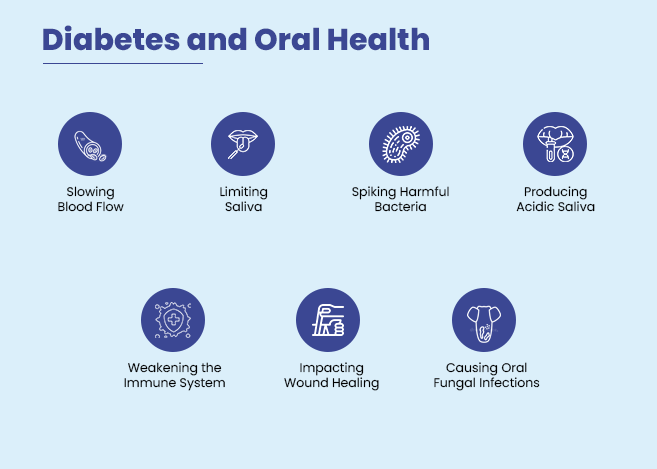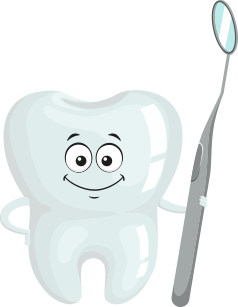Diabetes and Dental Problems: Taking Care of Your Teeth


Living with diabetes can be challenging, but with extra care and vigilance, you can maintain your oral health. Diabetes increases susceptibility to dental problems like gum disease, dry mouth, cavities, and infection. Fortunately, by understanding diabetes’ oral effects and diligently managing care, your smile can stay vibrant. This blog will examine diabetes and oral health and how to bolster your oral hygiene routine and catch problems early. Keeping your teeth and gums healthy reduces diabetes-linked complications and preserves your confidence.


How Diabetes Can Worsen Oral Health
Diabetes and oral health are linked in multiple ways:
Slowing Blood Flow: High blood sugar impairs circulation and deprives mouth tissues of oxygen and nutrients. This significantly slows healing and increases the risk of infection in gums and other areas.
Limiting Saliva: Uncontrolled diabetes inhibits saliva production, leading to chronic dry mouth. Saliva cleanses the mouth, protects teeth, and has antibacterial properties. Lack of saliva allows decay and disease to take hold.
Spiking Harmful Bacteria: The diabetic oral environment fosters the overgrowth of harmful bacteria like streptococcus mutans, which inflamed gum tissue, cause cavities, and breed infection.
Producing Acidic Saliva: High glucose levels make saliva more acidic, eroding tooth enamel, exposing sensitive dentin and raising tooth decay risk.
Weakening the Immune System: Compromised immunity makes fighting oral infections caused by bacteria harder.
Impacting Wound Healing: Poor circulation and high blood sugar impair healing of mouth wounds, ulcers and gum damage.
Causing Oral Fungal Infections: Excess sugar allows oral thrush and yeast growth, leading to further mouth irritation.
Warning Signs of Diabetes-Related Dental Issues
Those with diabetes need to be extra vigilant about the following common diabetes mouth symptoms and seek prompt treatment:
Red, Swollen, Bleeding Gums: Indicators of gingivitis or early-stage gum disease. If left untreated, it can progress to advanced periodontitis.
Receding, Discolored Gums: Signs of worsening periodontal disease, which can destroy connective tissue and supporting bone.
Persistent Bad Breath and Dry Mouth: Poor saliva production allows odor-causing bacteria to grow. Lack of saliva increases decay risk.
Increased Cavities: Tooth decay occurs more frequently, especially along the gumlines.
Slow-Healing Mouth Sores: High blood sugar delays the healing of cuts, ulcers and other oral wounds.
Frequent Oral Yeast Infections: Excess sugar promotes oral thrush and candida overgrowth.
Loose, Shifting Teeth: Advanced gum disease damages connective fibres and bone, jeopardizing tooth integrity.
Changes in Bite Alignment: Gum recession can cause teeth positioning to shift, altering the bite.
Tooth Sensitivity and Pain: Gum recession exposes sensitive root surfaces to pain from hot/cold foods. Diabetes and teeth pain can be managed with proper care.
Treatment Options to Restore Oral Health
If diabetes has already impacted your oral wellbeing, today’s advanced dentistry offers these effective diabetes gum disease treatment options:
Nonsurgical Periodontal Therapy: Non-invasive deep cleaning below the gum line to remove bacteria and tartar from pockets and smooth root surfaces and apply antimicrobials to disinfect.
Antibiotic Medication: Prescription antimicrobial pills or mouthwashes to fight infections caused by uncontrolled diabetes.
Gum Graft Surgery: Surgical grafting of gum tissue from the palate to areas with receding gums to protect roots and regenerate lost tissue.
Orthodontics: Can align teeth that have shifted due to gum loss and stabilize bite.
Sugar-Free Medications: Diabetes-friendly antibiotic, antifungal, and pain relief mouth rinses and gels to aid healing.
Saliva Stimulants: Medications or products to boost saliva production and relieve chronic dry mouth.
Sealants and Crowns: Apply sealants and crowns to shield susceptible teeth from accelerated decay.
Bone Grafts: Surgically implant bone material to replace areas of bone loss due to advanced periodontal disease.
Tooth Extractions: Remove infected, damaged teeth not salvageable through other treatments to prevent spreading infection.
Daily Dental Care for Diabetics
Controlling diabetes paired with diligent oral hygiene is vital to maintaining healthy teeth and gums. For this you can take help of a best laser dental clinic in Chennai and be consistent about:
Brushing Twice Daily: Brush gently for two minutes, angling the bristles under the gumline to disrupt bacterial plaque. Choose a soft or extra-soft bristle toothbrush.
Daily Flossing: Gently floss all sides of each tooth to clear away plaque bacteria hidden between teeth and just below the gums.
Antibacterial Mouthwash: Swish daily with mouthwash containing cetylpyridinium chloride to reduce bacteria.
Tongue Cleaning: Use a tongue scraper or brush to remove bacteria from the surface of your tongue.
Regular Dental Visits: See your dentist every three months for professional cleanings and close monitoring.
Blood Sugar Control: Keeping glucose levels in check will profoundly help oral health.
Smoking Cessation: Stop smoking to allow optimal gum blood circulation and healing ability.
Saliva Stimulation: Drink water, chew sugarless gum, or use a moisturizing gel to combat dry mouth.
By maintaining oral health you can cut the smile correction cost in Chennai and can live a healthier life.
Conclusion
By understanding elevated risks, adapting your oral hygiene routine, and acting quickly when problems arise, your dental health can stay on track even with diabetes. Radiant Dental Care is the best dental hospital in Chennai which understands the unique oral health challenges of diabetes and provides tailored diabetes gum disease treatment plans to help patients regain bright, healthy smiles. Our experienced dentists use advanced techniques and diabetes-friendly products for optimal comfort, recovery, and lasting results. Partner with us for compassionate care in maintaining lifelong dental health.
FAQs
How does diabetes affect your oral health?
Ans. Diabetes increases your risk of dental issues like gum disease, thrush infections, dry mouth, and tooth decay. Uncontrolled blood sugar levels impair healing, reduce saliva, and allow bacteria growth that damages gums and tooth enamel.
What are the signs of gum disease to watch for?
Ans. Red, swollen, or tender gums, receding gums, persistent bad breath, and loose teeth can signal the onset of gum diseases like gingivitis or periodontitis. Catching it early is essential.
Why is dry mouth more common with diabetes?
Ans. Diabetes inhibits saliva production, leading to chronic dry mouth, which allows cavity-causing bacteria to thrive. Lack of saliva also reduces the mouth’s ability to neutralize acids that erode tooth enamel.
How can you reduce dental problems with diabetes?
Ans. Careful brushing and flossing, using antibacterial mouthwash, having regular professional cleanings every three months, controlling blood sugar levels, and properly managing diabetes are essential.
What treatments can resolve diabetes-related dental issues?
Ans. Nonsurgical periodontal cleanings, gum grafting, tooth extractions, sealants, sugar-free medications, saliva stimulants, bone grafts, and antibiotics can all help restore oral health impacted by diabetes.


